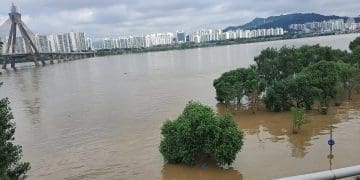Areas of the Amazon rainforest that Indigenous Peoples protect absorb thousands of tonnes of airborne pollution each year. This saves around $2bn annually in healthcare costs for the treatment of respiratory and cardiovascular diseases, according to a study published on 6 April.
The decade-long study analysed the health impacts of forest fires in the Brazilian Amazon. Land-grabbers, cattle ranchers, and others often set fires when they encroach on the forest. These fires release huge amounts of particles into the atmosphere. Such particles can travel hundreds of kilometres, damaging the air quality in distant cities.
By protecting their own lands against such fires, Indigenous Peoples help prevent thousands of cases of potentially deadly diseases, the study found.
Indigenous Peoples safeguard everyone’s health
The study, which the journal Communications, Earth & Environment published, found that Indigenous forests prevent 15m cases of disease each year. Researchers conservatively estimate that this saves the healthcare system at least $2bn. The lead author of the study, Paula Prist, from the US-based research group EcoHealth Alliance, said:
Worldwide, forests are known for absorbing pollutants from fires through pores on the surface of the leaves, but this is the first time we have estimated the capacity of tropical forests to do this
Our results indicate that the Amazon rainforest can absorb as much as 26,000 metric tonnes of the particles every year, and Indigenous territories are responsible for 27 percent of this absorption
In short, the actions of Indigenous Peoples are serving to protect other people, through the safeguarding of their health.
Indigenous Peoples protect biodiversity
Numerous studies have found that Indigenous lands play a key role in protecting forests and ecosystems. Indeed, although they make up less than 5% of the global human population, Indigenous Peoples’ territories hold as much as 80% of the world’s forest biodiversity.
Forests are hotbeds for wildlife, and their protection is key to tackling the extinction crisis. According to the UN, forests are home to 80% of the world’s amphibian species and 75% of bird species. 68% of terrestrial mammals live in them too, along with tens of thousands of tree species.
Needless to say, deforestation is a threat to the wild lives who inhabit the forests. Up to 85% of the Amazon’s known threatened species may have already been impacted by deforestation and fire, according to a 2021 study.
In other words, Indigenous Peoples play an outsized role in curbing both biodiversity loss and the climate crisis. As Dinamam Tuxa, executive coordinator of the Association of Brazil’s Indigenous Peoples (APIB), said of the airborne pollution study:
This study reinforces what Indigenous peoples have been saying for ages
It demonstrates the importance of our territories in fighting dangerous pollution… and climate change.
Richer countries and businesses are failing forests
Despite this, Indigenous Peoples continue to lack adequate assistance from others to protect their forested lands – and indeed themselves – from harm.
In the Amazon region, Brazil’s president Luiz Inacio ‘Lula’ da Silva has made some strides towards undoing the harms of his predecessor, Jair Bolsonaro. However, record-breaking deforestation rates are continuing. Indigenous leaders and environmentalists have urged Lula’s government to do more, such as following through on his promise to create new Indigenous reservations.
Moreover, as the Canary recently reported, wealthy countries welcomed Lula on the world stage. However, most of them are failing to step up to “fund the fight to protect the Amazon”.
Many major global firms and financial institutions that directly or indirectly contribute to deforestation are falling short too. Hundreds of them have not yet set a single policy on deforestation, according to a report Global Canopy released in February.
Additional reporting by Agence France-Presse
Featured image via Palácio do Planalto/ Wikimedia, cropped to 770×403, licensed under CC BY 2.0









